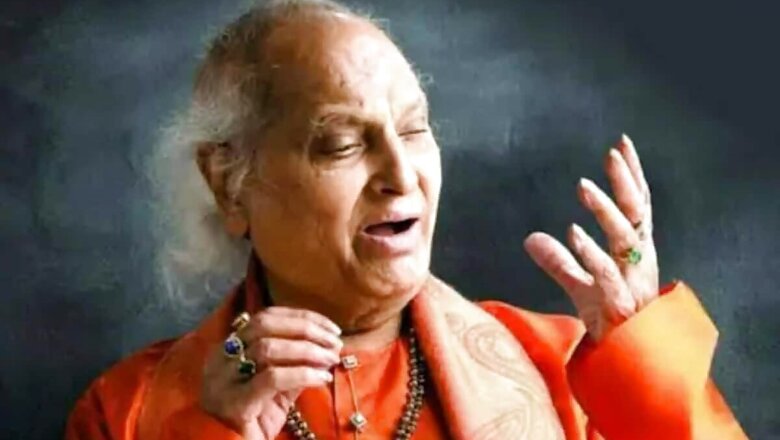
views
Pandit Jasraj, the doyen of Hindustani classical music and last of his generation, passed away in New Jersey on August 17 and was laid to rest with state honours in Mumbai last week. He was 90.
Circa 1999. Pandit Jasraj had kicked up a storm that was entirely his doing. He was upset with the government’s decision to confer the Bharat Ratna on Pandit Ravi Shankar. He said Ravi Shankar had lobbied for it and the Bharat Ratna couldn’t be bestowed on someone who had once said he would leave the country. To be fair, Jasraj had also said he would pay to watch a great artiste like Ravi Shankar. The media lapped up the juicy controversy, which died a natural death after few days. Pandit Jasraj was conferred the Padma Vibhushan in 2000.
I first got to attend a Jasraj live concert at New Delhi’s India Gate in 2003. It was an all-bhajan morning concert. By the time his last item, Om Namo Bhagawate Vasudevay, reached its crescendo, the entire audience was on its feet. Pandit Jasraj signed off in signature style with both hands half raised, to a standing ovation. He always began and ended his concerts with Jai Ho.
Those four bhajans that morning, Adi Deva Namostutam, Om Namo Bhagawate Vasudevay, Govind Damodar Madhaveti and Mero Allah Meherban turned me into a lifelong admirer of Pandit Jasraj’s music. There was a time I used to only buy two of his best-selling albums, Om Namo Bhagawate and Govind Damodar, to give away as gifts.
From his rich repertoire, equally powerful are scores of other devotional songs. Prominent among them are Mata Kalika, Hanuman Lala, Bibhushitananga along with his beautiful rendition of popular ragas like Jaijaiwanti, Miya Ki Malhar, Ahir Bhairav. Try his devotional songs whenever you feel depressed as they have a calming influence and they heal your mind.
Pandit Jasraj was a natural performer and an absolute darling of the audience. He connected with people effortlessly as none of his contemporaries could. He was jocular and in interviews he loved telling stories about his growing up years in Hyderabad with a childlike enthusiasm, how he bunked school to listen to Begum Akhtar near a roadside cafeteria.
Another story goes, his would be father-in-law, the legendary film maker V Shantaram once visited Pandit Jasraj’s Kolkata house, where he was eking out a living working with All India Radio, to enquire about his future plans. Jasraj told Shantaram he earned a small salary but “aage yeh aur ghat sakta hai” (it may reduce further) since he was about to quit his job and branch out on his own.
In Delhi once, the then chief minister Sheila Dikshit, a regular at his concerts, arrived late to one of his programmes and apologised. A witty Jasraj responded, “aaj programme late chalegi, sarkar jo khud samne hai”. (Live show can go beyond scheduled hours since the chief minister is late)
Born in a Haryana village in 1930, Jasraj had moved to Hyderabad at a very early age. But his father died on the morning he was to be appointed a court musician. Young Jasraj started playing the tabla with his illustrious musician brothers and guru Pandit Maniram and Pandit Pratap Narayan (father of Bollywood music composers Jatin-Lalit and actors Sulakshana and Vijayta Pandit). But after being ill-treated by a senior musician, he quit the tabla and took to classical singing.
He made Mumbai his home where he is survived by wife film maker Madhura Jasraj, daughter Durga Jasraj and composer son Shaarang Dev.
Arguably, Pandit Jasraj was Delhi’s most adored classical singer, performing to packed houses. Last November, when Delhi pollution was making headlines, Pandit Jasraj was to complete an evening of classical music at Sundar Nursery after Amjad Ali Khan and Padma Talwalkar. Both performances had gone very well, Amjad Ali Khan’s Rabindra Sangeet Ekla Chalore on sarod being the high point of the evening. As the audience waited with bated breath for Pandit Jasraj, the organisers announced he couldn’t make it as he was not keeping well. An entire audience, young and old, heaved a collective sigh and quickly left the venue consoling itself, “good he didn’t come, the pollution is anyway so bad.”
Though he returned to perform one last time in New Delhi at Gandhi Smriti on Januray 30 this year. To his countless admirers, Delhi winter won’t feel the same without the doyen performing in one of the city’s famed parks or auditoriums with the evening ending with his timeless classic Om Namo Bhagawate Vasudevay. He sang for his audience and not for himself. It didn't matter at all if one didn't understand the finer nuances of ragas. Listening to him was pure joy. It can be safely said he played a big part in bringing Hindustani classical music closer to the masses. And that’s Pandit Jasraj’s lasting legacy. Jai Ho!




















Comments
0 comment